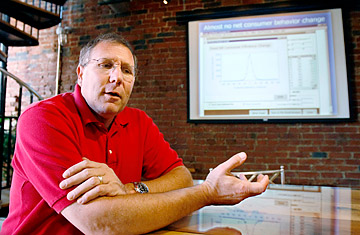
WeatherWise USA CEO Rand Warsaw discusses his patent case, which is being heard by the Supreme Court, at his Pittsburgh offices
It all started in 1997 when a little-known company wanted to patent a method for letting customers of utility companies pay a fixed, predictable sum each month. The patent office rejected their application on the grounds that it was "an abstract idea that simply solves a mathematical problem."
Huge legal expenses and 13 years later, the two men behind the case, Bernard Bilski and Rand Warsaw, had their day in the U.S. Supreme Court on Nov. 9. Most legal experts though, agreed that the duo had no chance of victory. "I don't think anyone other than Bilski thinks that Bilski deserves a patent," says Mark Lemley, a professor of law at Stanford University.
The bench seemed to reflect this view, and several Justices suggested somewhat humorously that if the Bilski argument were to proceed, a number of other ludicrous patents could be issued. Justice Antonin Scalia asked if under Bilski's argument, methods of horse-training could be patented, while the court's newest member, Justice Sonia Sotomayor, asked if a "method of speed-dating" was patentable.
Undeterred, the counsel for Bilski, J. Michael Jakes, replied that some of the examples could potentially be patented as long as they are novel, not obvious and not simply abstract ideas.
The deeper reason behind the Supreme Court Justices' choosing to hear this case has to do with the nuances of the decision at a lower court. After the U.S. patent office denied their patent in 2006, the Bilski-Warsaw duo took their appeal to the Court of Appeals for the Federal Circuit. The panel of 12 judges heard the case, and came to the conclusion that the patent office was justified in its dismissal.
In the majority opinion issued in October 2008, the judges wrote that in addition to being something novel and nonobvious, such a patent should be something that "is tied to a particular machine or apparatus" or "transforms a particular article into a different state or thing." This has since been known as the "machine-or-transformation test" and has sent shockwaves through the information-technology industry.
"Particularly in cases involving software and biotech innovations, there are valuable innovations that have 'machine-like' procedures but do not involve the creation of a special machine or any sort of chemical transformation," wrote Christopher J. Wright, head of appellate practice at Wiltshire and Grannis LLP in an e-mail message.
Tech powers IBM, Microsoft, Google, Yahoo! and financial firms like American Express and Goldman Sachs control hundreds of such business-method patents for everything from search-engine optimization to risk assessment. And if you have ever bought something on Amazon, you've probably used the company's patented 1-Click ordering process.
